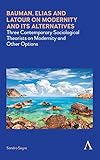Bauman, Elias and Latour on modernity and its alternatives : three contemporary sociological theorists on modernity and other options / Sandro Segre.
Material type: TextPublisher: London : Anthem Press, 2020Description: 1 online resource (viii, 104 pages) : digital, PDF file(s)Content type:
TextPublisher: London : Anthem Press, 2020Description: 1 online resource (viii, 104 pages) : digital, PDF file(s)Content type: - text
- computer
- online resource
- 9781785273056 (ebook)
- 909.82 23
- CB428 .S47 2020
| Item type | Current library | Collection | Status | Barcode | |
|---|---|---|---|---|---|
 eBooks
eBooks
|
Central Library | Sociology | Available | EB0104 |
Title from publisher's bibliographic system (viewed on 20 Jan 2022).
<i>Bauman, Elias and Latour on Modernity and its Alternatives</i> provides a synopsis of and comparison between the conceptions of modernity and its alternatives, as found in the works of Bauman, Elias and Latour. Bauman and Elias share a few relevant features bearing on their conceptions of modernity and its possible alternatives; Latour, on the other hand, when compared to these sociologists, is a maverick thinker. The set of alternatives is as follows: modernity vs post-modernity (Bauman); civilization vs barbarity (Elias) and successful vs unsuccessful hybrids (Latour). Bauman's and Elias' conceptions of modernity differ in some important respects. The constitutive elements of modernity are, according to Bauman, cognitive order, regulation, stability of relations and identities, and the role of intellectuals as legislators. In Elias' view, pacification and civilization are the hallmarks of modernity. Both Bauman and Elias maintain, despite their differences, that a condition of barbarity indicates the absence of civilization, but not of modernity. According to Latour, the scientific usefulness of the concepts of modernity and, by implication, of non-modernity is questionable. If hybrids are defined as heterogeneous associations between humans and non-humans such as instruments and machines, by virtue of their great number they produce a variety of ways in which distinct and incompatible modes of knowledge may be interpreted, defined, and linked. This occurs by means of mediators.
There are no comments on this title.
